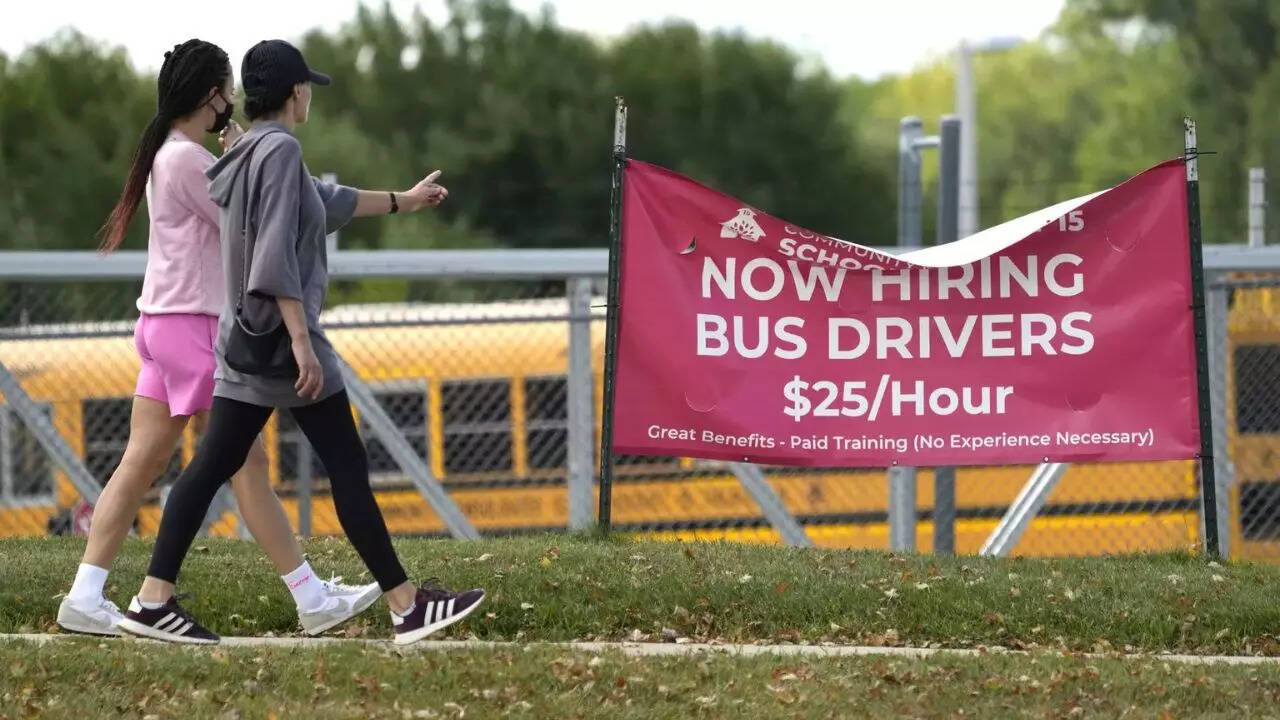
[ad_1]
Applications for US unemployment benefits fell to their lowest level in eight months last week as businesses continue to retain workers despite elevated interest rates meant to cool the economy and labor market.
Jobless claim applications fell by 13,000 to 198,000 for the week ending Oct. 14, the Labor Department reported Thursday. That’s the fewest since January and about 14,000 fewer than analysts expected.
Jobless claim applications are considered a proxy for layoffs.
Despite the low level of weekly first-time jobless benefit applications, the number of Americans remaining on the unemployment rolls – known as “continuing claims” – jumped to its highest level in three months.
Overall, 1.73 million people were collecting unemployment benefits the week that ended Oct. 7, about 29,000 more than the previous week and the most since early July.
Analysts suggested one reason why new applications for unemployment aid might be falling while the number of people who continue to receive benefits is rising: Though relatively few people are being laid off, those who are already unemployed may now be having a harder time finding new work.
“That would be consistent with other recent anecdotal evidence, including the Beige Book yesterday, which noted that firms were hiring ‘less urgently’ and finding that the pool of available job candidates was expanding,” said Nancy Vanden Houten, an economist at Oxford Economics.
That comports with recent data showing that more people have started looking for work again. In August, about 736,000 people re-entered the search for employment, boosting the unemployment rate from 3.5% to 3.8%, where it remains today. Only people who are actively looking for a job are counted as unemployed.
Though the Federal Reserve opted to leave its benchmark borrowing rate alone at its most recent meeting, it is well into the second year of its battle to rein in persistent inflation. The central bank has raised its benchmark rate 11 times since March of 2022, with part of its goal to cool hiring and bring down wages. But the labor market has held up better than expected.
In September, employers added 336,000 jobs, easily surpassing the 227,000 for August and raising the average gain for each of the past three months to a robust 266,000.
In August, American employers posted a surprising 9.6 million job openings, up from 8.9 million in July and the first uptick in three months.
Besides some layoffs early this year – mostly in the technology sector – companies have been trying to retain workers.
Thursday’s report also said that the four-week moving average of claims – which flattens out some of the week-to-week volatility – ticked down by 1,000 to 205,750.
Jobless claim applications fell by 13,000 to 198,000 for the week ending Oct. 14, the Labor Department reported Thursday. That’s the fewest since January and about 14,000 fewer than analysts expected.
Jobless claim applications are considered a proxy for layoffs.
Despite the low level of weekly first-time jobless benefit applications, the number of Americans remaining on the unemployment rolls – known as “continuing claims” – jumped to its highest level in three months.
Overall, 1.73 million people were collecting unemployment benefits the week that ended Oct. 7, about 29,000 more than the previous week and the most since early July.
Analysts suggested one reason why new applications for unemployment aid might be falling while the number of people who continue to receive benefits is rising: Though relatively few people are being laid off, those who are already unemployed may now be having a harder time finding new work.
“That would be consistent with other recent anecdotal evidence, including the Beige Book yesterday, which noted that firms were hiring ‘less urgently’ and finding that the pool of available job candidates was expanding,” said Nancy Vanden Houten, an economist at Oxford Economics.
That comports with recent data showing that more people have started looking for work again. In August, about 736,000 people re-entered the search for employment, boosting the unemployment rate from 3.5% to 3.8%, where it remains today. Only people who are actively looking for a job are counted as unemployed.
Though the Federal Reserve opted to leave its benchmark borrowing rate alone at its most recent meeting, it is well into the second year of its battle to rein in persistent inflation. The central bank has raised its benchmark rate 11 times since March of 2022, with part of its goal to cool hiring and bring down wages. But the labor market has held up better than expected.
In September, employers added 336,000 jobs, easily surpassing the 227,000 for August and raising the average gain for each of the past three months to a robust 266,000.
In August, American employers posted a surprising 9.6 million job openings, up from 8.9 million in July and the first uptick in three months.
Besides some layoffs early this year – mostly in the technology sector – companies have been trying to retain workers.
Thursday’s report also said that the four-week moving average of claims – which flattens out some of the week-to-week volatility – ticked down by 1,000 to 205,750.
[ad_2]
Source link
